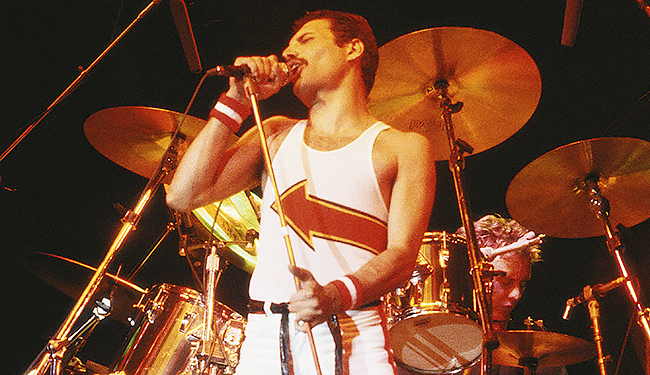
When you go to sporting events in these United States of America, there are a handful of songs you hear with great frequency. “Seven Nation Army” by The White Stripes has become a new staple. The opening guitar part of “Welcome to the Jungle” gets blasted here and there. The Detroit Red Wings play Journey’s “Don’t Stop Believin’ ” at essentially every game because the fans like to yell along to the “born and raised in South Detroit” part. The Chicago Blackhawks trot out that annoying “Chelsea Dagger” song after goals because they are lame and the Detroit Red Wings are great. No matter which arena or stadium youre in, though, you’ve assuredly heard “We Will Rock You.” In times of celebration, you’ve likely heard “We Are the Champions.” There’s also a good chance you’ve heard “Another One Bites the Dust,” perhaps to celebrate the elimination of a playoff opponent.
As those songs have been deeply engrained into the sporting atmosphere here for decades now, you may never have taken the time to really think about how unlikely it is that Queen became the band who supplied us with all these anthems. That’s not to say it doesn’t make sense that these particular songs became athletic touchstones. “We Are the Champions” is basically designed for sporting accomplishments; there’s a reason they sing it at the end of D2: The Mighty Ducks Are Back. “We Will Rock You” is not only a sentiment that applies to sports fans taunting opponents, the “boom boom clap” nature of it is incredibly catchy and simple to replicate with stomping feet and clapping hands. It all works perfectly.
The surprise comes from it being these guys, and this band, being the ones who emerged as arena-rock staples. This was not what Queen was, especially at the beginning. This is, after all, the band whose most famous song that hasn’t been mentioned yet is essentially an operatic suite. That’s perfectly fine for rocking out in a car, but even within that context it feels odd, because there is no context wherein “Bohemian Rhapsody” doesn’t feel odd. It’s a really good song, but it’s also spectacularly singular.
Queen’s second album, Queen II, features songs with names such as “Ogre Battle,” and “The Fairy Feller’s Master-Stroke.” Early Queen is fairly glammy, fairly proggy. This early music has largely been forgotten by those who are not diehard fans of the band. Their first song with any real lasting legacy, “Killer Queen,” is from their third album, Sheer Heart Attack. Again, a fine song, but nothing like what you expect to hear at a sporting event. It’s too lilting and fancy. Freddie Mercury, while a great vocalist, does not have the sort of sandpaper, whiskey-soaked voice you might imagine rousing fans while football players bash into one another or what have you. Even on, say, “We Are the Champions,” his voice is much prettier than anything Jack White can muster.
This was the start of a fruitful period for Queen, as their next album, A Night at the Opera, had some of their biggest hits, including “Bohemian Rhapsody.” The followup, A Day at the Races, didn’t connect with people as much (although history has judged it more kindly), but this led to a change of direction for 1977’s News of the World. It would be their sixth album, and it’s the album that gave them sporting immortality.
The album opens with the one-two combo of “We Will Rock You” and “We Are the Champions.” Brian May intentionally wrote simplicity into “We Will Rock You” to engage fans at their concerts. That carried over to another place where large groups of people congregate. The song is also perfectly proportioned, as it is only 2 minutes long. Two minutes of stomping, clapping, and shouting “We will, we will, rock you,” with occasional prompts to “sing it.” It’s so perfect for a sporting event that it seems almost written for the occasion. What makes it delightful is that it wasn’t.
This did not represent a sea change for the band, though. Queen’s next album, Jazz, is pretty weird. It has “Fat Bottomed Girls” and “Bicycle Race” on it. They did the soundtrack for Flash Gordon. In 1980, they recorded “Another One Bites the Dust,” which mostly has weaseled its way into the sporting world because the chorus can be used to rub salt in the wounds of vanquished opponents. It’s also a disco song embraced in the world of sports, a place where something like Disco Demolition Night once happened. They just kept up doing their thing until Mercury’s AIDs-related death in 1991. Fortunately, the lasting legacy of Queen’s sports anthems all but guarantees his work, and his voice, will not be forgotten. Queen decided to take a more mainstream tack for an album, and all they did was create two of the most famous, culture-saturating songs of all-time. Yet, in the grand scheme of things, they remain outliers in Queen’s catalog.
Queen didn’t make jock jams. They didn’t make songs with inane dances that people can do to move around a bit during breaks in the action. They were an eclectic, eccentric band who, along the way, wrote a few songs that clicked into place perfectly for sporting events. People will be stomping and clapping and singing about how they will rock you long after we are dead. Even after all these years of being able to grow accustomed to the ubiquity of Queen’s music at arenas and stadiums, it will never fully make sense. Three British guys, including one who has a Ph.D. in astrophysics, and a gay Indian man born in Africa managed to accidentally infiltrate the often insular world of American sports fandom, and all they had to do was create simple, incredibly catchy songs.






